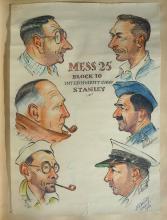15 May 1943, John Charter's wartime journal
Primary tabs
The ‘HK News’ the other day complained that the British Government had declared the HK dollar valueless. This was instanced as another way in which Britain abandoned to their fate it’s former allies and subjects. Actually, I wonder why the British Government took so long to call in the HK Dollar and declare it valueless. I believe it had a wide circulation throughout the East and perhaps its early recall would have upset credit in other British centres.
There is still no sign of any further allowances. Last night, alas, we finished our last spoonful of IRC cocoa, so we shall now have to content ourselves with milkless tea or cold water for supper. Still, it was very nice to have it during the cold months of winter and we made it last quite well (considering we had thought we should be out of here by the end of March!)
I hear again that all arrangements for repatriation are complete; that we are to go on neutral ships with a Japanese and British representative on board each ship: and that the Australians are to be the first to go, the date being the middle of next month. I wonder!
The paper today is interesting. It admits the cessation of fighting in the North African campaign, claiming that the German and Italian troops had gained their objective, namely to tie up large American and British forces while the fortifications in Germany and Italy were completed. The paper now proudly boasts that (to use their words) “…the entire Europe is now one solid mass of fortifications”. Such a statement is really laughable for it is testament to an admission that Germany and it’s allies are feverishly preparing themselves to fight a defensive war – and that is a thing that Germany cannot afford to do.
The paper also announces that fierce fighting has again broken out in New Guinea between American and Japanese troops; that a strong American force has landed in Ottu (or Cisea) Island in the Aleution group; that Canton was bombed on May 8th (we heard, unofficially, by 100 planes and that much damage and many casualties were sustained by the Japanese military establishments and personnel). Also that Admiral Halsey and General MacArthur, Chiefs of the S. Pacific Land and Sea forces had met in Australia to confer on the condition of affairs in the Pacific. All this seems to be indicative of the outbreak or the pending outbreak of fresh offensives out here.
Recently two black-outs were ordered here and I presume, in town too. The first was on April 24th and lasted 4 nights, and the second was on Saturday May 8th and lasted another 4 nights. During the days of the first black-out there were considerable shipping movements: a large ship carrying navigation lights came in past the Lammas at about 10 p.m. We presumed that as it was carrying lights it must be a hospital ship. Quite a number of hospital ships come in and out of here; why, I do not know, for there is no fighting going on in this neighborhood as far as we know. Another day a convoy of 6 tramps went out (going south) escorted by a destroyer.
The second black-out I imagine was because of the bombing of Canton. The Japanese are very much stricter about the black-out now and we must not show the least chink of light: so we have to hang heavy blankets over the windows, as well as shading the light, and this makes the room terribly hot and stuffy. Many people prefer to have the windows open and sit in the dark. It will be impossible to black-out the windows in the really hot weather.
Recently there have been two tragic deaths in camp. The first, which occurred in the second week of April, was that of the Puisne Judge, Justice P.E.F. Cressal. He died of paralysis which started in his leg one day when he was leaning over the balcony to hang up a shirt he had washed. He was taken to the hospital where it attacked his spine. He was critically ill for a week or so but the medical people thought he would pull through. However, one night the paralysis spread up his neck to his head and it killed him. I heard first that the paralysis was due to some virus and then that it was due to alcoholic poisoning. This second cause was refuted later, though Cressal was a heavy drinker. However, I don’t know how he could have got hold of so much alcohol in this camp, though I know some of the inferior local stuff does come in by devious ways. Poor Cressal, he was intensely unhappy here because he felt he was very unpopular and was ignored by most people. He certainly hated Hong Kong and to end his life in this way in this miserable camp was very tragic. I must say I was no admirer of his and avoided him as much as did anyone else, but I must say I wish his life had ended more happily. How sad for his wife and family too. They never reached Hong Kong.
The other death was even more tragic. It occurred a week or two later and the victim was Mrs Teddy Evans.

